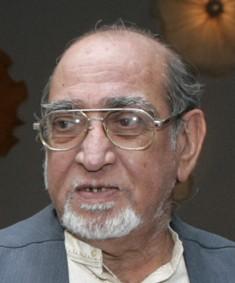The death of Indian scholar and reformist Mr. Asghar Ali Engineer comes as something of a surprise to those who continue to read his lively writings on the problems of the Indian day… Mr. Engineer dedicated his life to tolerance and peaceful religious co-existence, for which he accepted the Right Livelihood Award in 2004 – “for promoting over many years in South Asia the values of religious and communal co-existence, tolerance and mutual understanding.”
He passed away on May 14th, at the age of 74. He is survived by his son Irfaan and his daughter Seema.
Writing prolifically on Hindu-Muslim relations, he established the Centre for Study of Society and Secularism to promote communal harmony in 1993. He had of late written extensively on the need for the fullest realisation of women’s rights in Muslim countries, which he argues is consistent with what has been prescribed in the Qur’an.
Asghar Ali Engineer – of the Dawoodi Bohra – was born in a Bohra priestly family on 10th March, 1939 in Salumbar, Rajasthan (near Udaipur) where Sheikh Qurban Husain, his father, was an amil at that time. Asghar Ali was given training in Qur’anic tafsir (commentary), Tawil (hidden meaning of Qur’an) fiqh (jurisprudence) and hadith (Prophet’s sayings).
Mr. Engineer also acquired secular education besides a religious one. He graduated in civil engineering from Indore (M.P.) with distinction and served for 20 years as an engineer in Bombay Municipal Corporation and then took voluntary retirement to plunge himself into the Bohra reform movement. He began to play a leading role in the reform movement from1972 when the revolt took place in Udiapur. He wrote several articles on the reform movement in the Seventies in the leading newspapers of India such as The Times of India, Indian Express, Statesman, Telegraph, The Hindu and others. He was unanimously elected as General Secretary of The Central Board of Dawoodi Bohra Community in its first conference in Udiapur in 1977 and has continued in the post ever since.
Mr. Engineer has also done a great deal of work on communalism and communal violence in India since the first major riot in India in Jabalpur in 1961. Dr. Engineer, as he is known since then, is also recognised as a distinguished scholar of Islam.
He believed in showing equal respect to all religions and he considered faith in religion as most vital for a meaningful life. However, he did not believe in blindly accepting dogmas inherited from the past. He believed in re-thinking issues and re-interpreting Islam in keeping with the changed times. He is of the opinion that it is our individual obligation to acquire Islamic learning and reflect deeply rather than following any one blindly.










